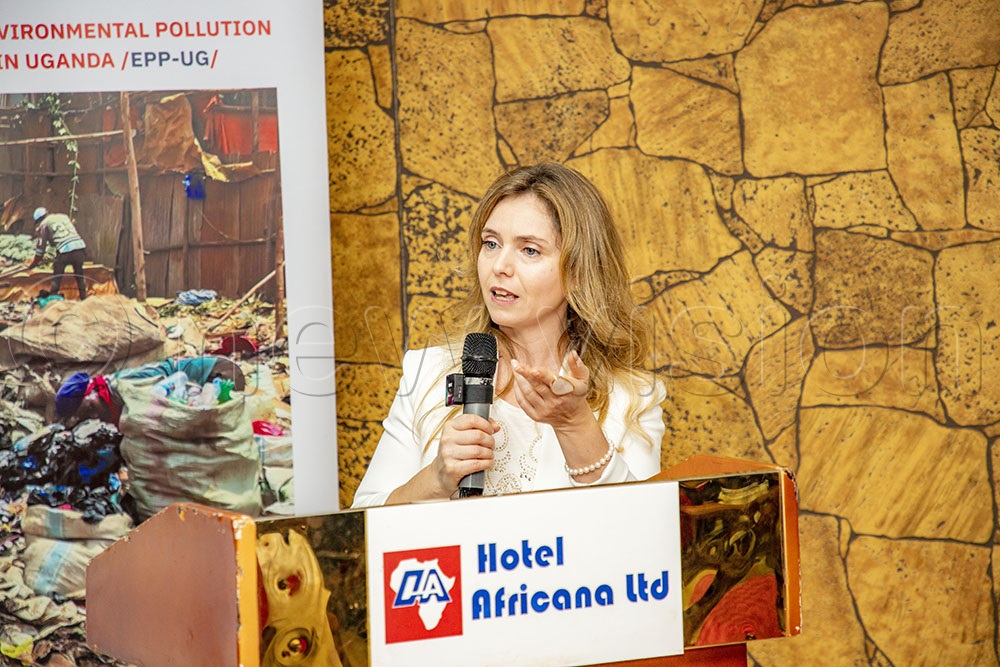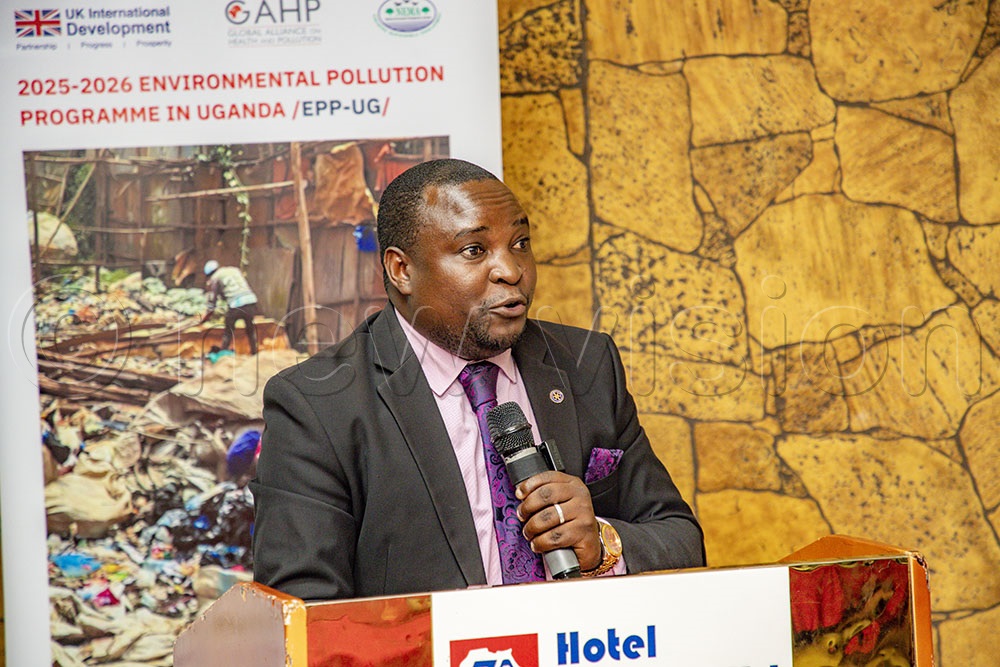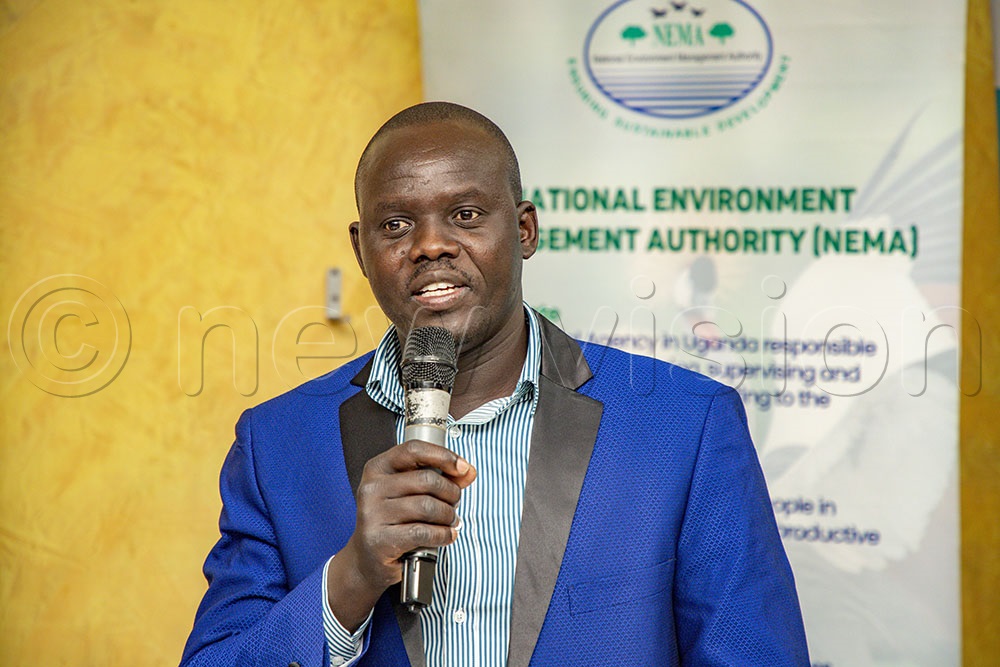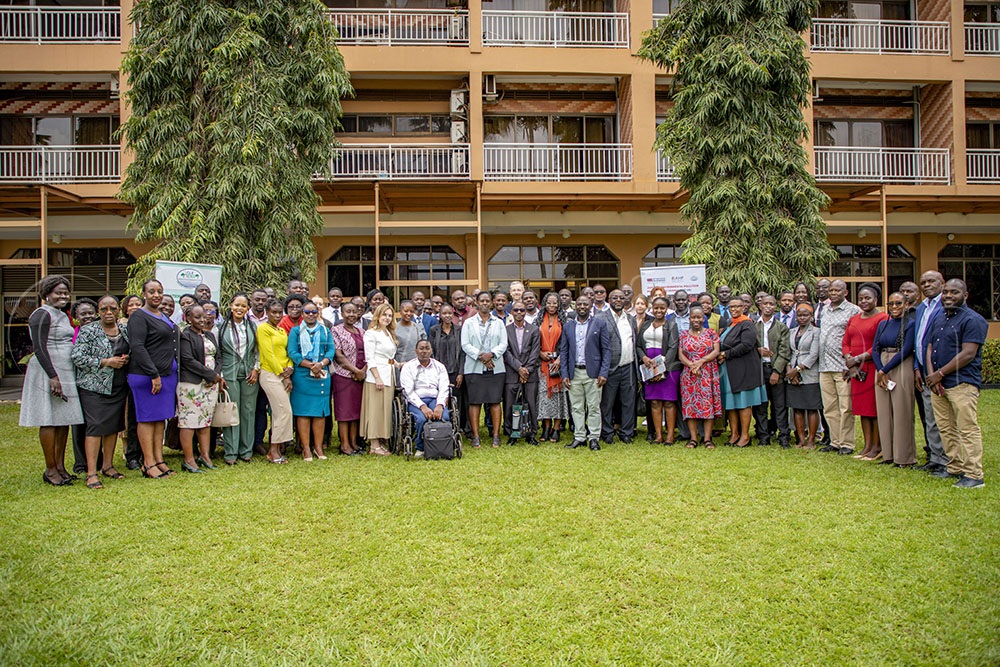Waste handling: Kampala needs 15 new garbage trucks every 3 years
“We call on government for a replenishment of at least 15 trucks every three years,” said James Bond Kunobere, Deputy Director of the Sanitation and Environment Management Department at KCCA.
The deputy director sanitation and environment management department at Kampala Capital City Authority (KCCA) James Bond Kunobere addressing participants during the environmental pollution program conference. (Photo by Agnes Kyotalengerire)
__________________
In a bid to enhance solid waste management across Kampala, the Kampala Capital City Authority (KCCA) is calling on the government to provide at least 15 new waste compaction trucks every three years.
“We call on government for a replenishment of at least 15 trucks every three years,” said James Bond Kunobere, Deputy Director of the Sanitation and Environment Management Department at KCCA.
Kunobere noted that one of the most pressing challenges in the city’s waste management system is the shortage of reliable trucks to collect and evacuate garbage from communities.
The executive director Global Alliance on Health and Pollution (GAHP) Maria Paola Lia addressing participants during the Environmental Pollution Program conference. (Photo by Agnes Kyotalengerire)
Currently, KCCA has a fleet of only 28 compacting trucks, but not all are operational. He said about 7 trucks are parked at the yard and require repair, and that due to frequent breakdowns, they often operate with only about 15 to 18 trucks.
He attributed the high rate of wear and tear to the nature of the waste itself; that waste collection and transportation deteriorate trucks very fast because of the methane that is produced within. “A lot of heat is generated as waste is taken to the dump site, which corrodes the truck body. Once holes form, the compaction process becomes ineffective,” he added.
Looking to the future, KCCA envisions a more decentralised waste collection system, with one compaction truck per parish. “If we had a fleet of 100 trucks, we would be able to evacuate all the waste,” Kunobere said.

The board chairperson Global Alliance on Health and Pollution (GAHP) Raymond Ruyoka addressing participants during the EPP conference at Hotel Africana. (Photo by Agnes Kyotalengerire)
He further criticised the low prioritisation of waste management in the national budget, despite its high cost and implications.
“If we don’t manage waste properly, we will see a rise in disease burden. The government will end up spending more on medication and treatment in health facilities. Infrastructure will be damaged, property will be lost, and even lives could be at risk. Once waste ends up in drainage systems and blocks them, flooding occurs and roads are swept away,” Kunobere warned.
“Failure to manage waste also affects the city’s rating and reputation,” he added.
Kunobere made the remarks at the Environmental Pollution Programme (EPP-UG) conference held at Hotel Africana in Kampala on Tuesday, October 7, 2025. The two-day event (October 6–7) was organised in collaboration with the Global Alliance on Health and Pollution (GAHP) and funded by the UK Government through its Department for Environment, Food and Rural Affairs (Defra).

The Chemical Safety, Radiation, and Pollution Prevention Manager, NEMA Uganda Dr. Innocent Achaye addressing participants during the conference. (Photo by Agnes Kyotalengerire)
The conference brought together more than 80 participants from various sectors, including the National Environmental Management Authority (NEMA), the Ministry of Water and Environment, the Ministry of Health, the Ministry of Agriculture, private sector players, academia, and civil society organisations to discuss Uganda’s response to environmental pollution.
Maria Paola Lia, Executive Director of GAHP, emphasised the importance of practical interventions. She said the multi-stakeholder working groups will prioritise interventions that lead to actionable solutions to reduce deaths and illness caused by pollution.
GAHP, a Swiss foundation, works globally to support governments in prioritising pollution control to improve public health.

Participants of the Environmental pollution program conference pose for a group photo. (Photo by Agnes Kyotalengerire)
Raymond Ruyoka, GAHP Board Chairperson, highlighted the importance of collaboration. “Each actor contributes uniquely - government through policy and funding, private sector through sustainable investments, and civil society organisations through accountability, advocacy, and mobilisation,” he said.
Dr Innocent Achaye, Manager of Chemical Safety, Radiation, and Pollution Prevention at NEMA Uganda, said the EPP-UG conference was timely and necessary. He said it provided an opportunity to address the escalating environmental pollution in Uganda.